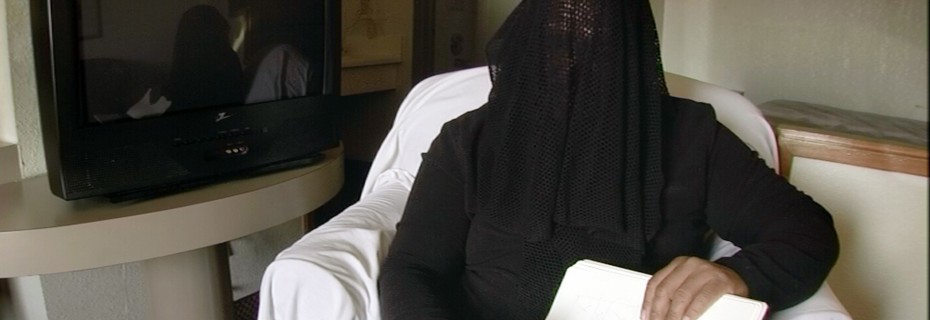Charles Bowden discusses ‘El Sicario, Room 164’ – PART TWO

Recently, Hollywood Soapbox talked with Charles Bowden, the award-winning journalist and author of several books about the Mexican drug business. The writer’s latest project is El Sicario, Room 164, a documentary that highlights the testimonial of a former contract killer for the Juárez, Mexico drug cartel. Bowden wrote the original story about the sicario (hit man) and co-produced the documentary with director Gianfranco Rosi.
Read our review of the film here. Read the first part of our interview here.
In the second part of our interview, Bowden discusses solutions, salvation and safety.
(Answers have been edited for brevity and clarity.)
Do you think the sicario puts a face on these faceless crimes? Your career has tried to humanize a lot of these statistics. Does getting him to talk give that side that is often missing in stories?
Yes, that’s why I wanted him. I’ve been in bars where you can look and there are guys like him. But they are not going to talk with you.
I wanted to know what it was like to be that type of person. But as to what he is, he’s not simply putting a face on faceless crimes. What he is is the face of the Mexican government. He’s not a rogue cop. This is their police force.
He wasn’t a street cop. He was a commander in the Chihuahuan state police. This is the government. The government uses people like him to terrorize Mexicans to keep control and always has. This is not new.
This is a man who has killed hundreds of people and has never been charged in any country, because he was a state police commander, because he was protected by the Mexican state, because he knew people in the Mexican Army, because he was part of the establishment, to use an American phrase.
That was one of his motives for speaking. He had another motive: He’s become a Christian.
So, he actually wanted, in part, to speak so that younger men wouldn’t go down the path he’d gone down. In other words, like most Christians, he’s trying to get redemption for himself. But he is appalled by the Mexican government, and he had significant dealings with it at times.
There is no war in Mexico between the Mexican government and the drug world. There is a war in Mexico between the Mexican government and people in the drug business over how much share of the money and power the Mexican government gets.
For 20 years, he was inside the machinery. And he’s one of the rare people to come forward and talk about it.
Were you surprised that he had found God? He describes his past in such a mechanical way that I was taken by surprise that he had found God.
Well, I knew he had become a Christian, because I initially interviewed him, he would insist after hours … that we pray together. He would put his arm around me. He’s basically a born-again Christian. I’m one of those Christians that never seemed to have gotten born.
Initially, I went to him, I wanted to do a film on Juárez with Gianfranco. And this guy would be like a floating background, like Darth Vader. And we told him we need maybe five to seven minutes of him for this project.
And he agreed to that.
Then he started talking, and after an hour or so, we took a break during the filming and I went outside with Gianfranco, and Molly Molloy was there, and we all agreed that something was happening. This wasn’t going to be five minutes. We should just get out of the way and let it happen.
We just let him go. I was just astounded as you were when the conversion thing actually was filmed. I knew his beliefs, but we had never gone in depth. It was like this emotional explosion. And when it ended, we had to stop filming and hold him. He was sobbing uncontrollably.
I don’t think he could do it again. I don’t think the footage you saw, using him, could be replicated. Because I don’t think he planned to break down.
This is not a person who breaks down a lot. He went to a place he didn’t plan to go. Reached inside himself to try to convey this thing. He was shattered.
In the filming, he broke down twice.
I think this thing was – to use a tiresome term – cathartic for him. And I think it has the power that it has because it’s not a Q&A. I asked him one question. The whole fucking thing you saw was one question, which isn’t in the film.
I said, ‘Look, when we talked before, when I did the article, you said you broke your life into four parts. Can you explain that to us?’
That is the only time I ever asked a question in the whole fucking film.
He was an unusually coherent man. I’ve known other men like that, but they are very rare. I’m certainly not one of them – that can speak essentially flawlessly hour after hour.
Editing this thing was cutting it down and structuring it, but it wasn’t getting rid of a bunch of bad footage. The footage we threw away was like the footage you saw. It’s just as coherent.
He’s a very bright guy, which you have to say, this lower-class person with limited education who came from total poverty. If he had been born 10 miles north in El Paso, he would be a professional person with a nice home and good reputation.
And he’s trying to live a quiet life now?
He’s trying to live a quiet life, but the problem is they keep finding him.
He’s disappeared. I did something he wanted to do that caused him to disappear: publicity.
But he had to move every 10-20 days when I knew him. He would have to suddenly leave, out the door.
People are looking for him. You get hundreds of thousands of dollars if you kill him. Now what he wanted me to do was publicize it because it was sort of Christianity. He doesn’t want to be a movie star, he wants people to see this.
So Processo, a publication you may have not heard of, but it’s the most prestigious magazine in Mexico. Everybody reads it who has power or education. It has a circulation of about 130,000. But basically it is the most powerful magazine in the country.
I had drinks with their reporter. He was up interviewing me on something else. I said, ‘I got this little movie that might interest you.’
I gave it to him, and three weeks later, it’s the cover story of Processo. Well, that raised the heat of the sicario a couple thousand degrees. I saw him before he left, but that’s when he disappeared.
He said, ‘You did too good a job.’
I said, ‘Well, I do my best.’
The pressure on him got too great, because of the things he says in the film. But he makes it clear, what I’m telling you, that the drug world and the Mexican state are inseparable. They are one in the same. It is a totally corrupt structure.
I like the guy. I’ve had people tell me this, one of the things that disturbs them in the film is that they wind up liking the guy or being attracted to him at some level.
All I could tell you is that he is human. He’s not a psychopath. He’s kind of like you, or me. There’s really not that much difference. He just did this thing.
I think what he did is within all of us, the capacity. He was just unusually good at that.
When I say that, I have to tell you the truth, I can’t imagine doing that. I was raised in the West. I used to hunt, but shit, I can kill a fly. I can’t even fathom torturing people and all the stuff he did, much less boiling them alive.
You’ve studied Juárez and reported on the city for so long. I hate to put you in the position of trying to prescribe some kind of solution down there. Is there any hope of optimism?
There are things that can be done by U.S. citizens that would make things better for Mexicans, which would lower the violence.
First, renegotiate NAFTA, so it doesn’t create factories in Mexico that have slave wages. I use that term deliberately. No human being has ever lived to work in an American factory in Juárez, take the wages after seven days and live on them. They’re not enough. That’s not opinion. That’s absolute.
The cost of living in Juárez is about 90 percent of what it would cost to live in the U.S. The American factories pay about $60 a week. There are people living in shacks who have to pool two, three, four wages.
Two, legalize drugs. You spent a million dollars, created the largest prison population per capita on the surface of the Earth, terrorized our own people and created a huge hierarchy of criminal power in Mexico, funded by the fact that drugs are illegal.
Three … do not give $500 million a year to the Mexican Army, because the Mexican Army is the largest single criminal organization in the country. It’s had thousands of human rights violations.
Four, renegotiate our immigration policy. We cannot have 10, 12, 15 million people living in our own society in the shadows.
You finish that list, I’ll work on another one. All those things will make things better.
If you want to kill more people, if you want to put more Americans in prison, if you want to create more poverty, if you want to finance a murderous Army, change nothing in your policies. Do everything the way you are, and everything will get worse.
By John Soltes / Publisher / John@HollywoodSoapbox.com

